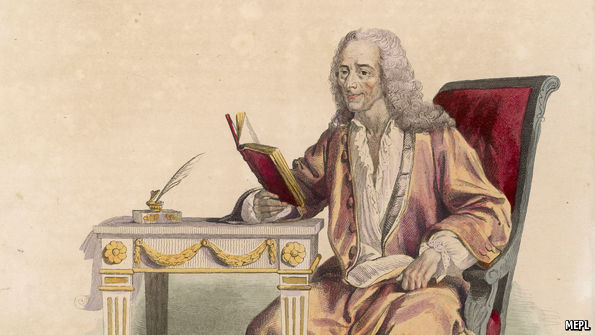History of philosophy
Seeing the light
A well-documented account of the second golden age of Western philosophy

WESTERN philosophy has had two golden ages. The first was the
remarkable explosion of thought in early Athens, sparked by Socrates and
continued by Plato, Aristotle and their followers. Then came the great
flowering in northern Europe in the 17th and 18th centuries, when a
diverse group of thinkers questioned received opinion and put their
faith in reason in what is now known as the Enlightenment. This story is
too simple to be the whole truth; but it is a narrative that is useful
for those coming to the history of Western philosophy for the first
time, even if they revise or abandon it later on.
“The Dream of Enlightenment”, the second in a planned trilogy that
began with “The Dream of Reason”, Anthony Gottlieb focuses on some of
the great Enlightenment thinkers, including Descartes, Hobbes, Spinoza,
Locke, Leibniz, Hume, Rousseau and Voltaire. He offers engaging
summaries of their main ideas and choice details of their lives. They
were freelance philosophers working independently of the universities,
criticising mainstream views and liberating thought from its academic
straitjacket and neo-Aristotelian dogmatism.
They were dangerous thinkers all, one publication away from exile,
imprisonment or worse for their radical views on religion, politics and
morality. Spinoza was the subject of a cherem, the equivalent of excommunication from the Amsterdam Sephardic synagogue; Locke disguised his
uised his authorship of “Two Treatises of Government”, and spent a
number of years in self-imposed exile; Hume chose to publish his
“Dialogues Concerning Natural Religion” posthumously; and Rousseau fled
to England when persecuted in mainland Europe. Metaphysics was far from
the safe activity it is today, and was often condemned as blasphemy or
heresy.
In an essay called “What is Enlightenment?”, written in 1784,
Immanuel Kant crystallised the essence of the movement in the motto Sapere aude
(“Dare to know”). Humanity had used reason to emerge from its state of
immaturity, he argued. For many, Kant is the supreme example of an
Enlightenment philosopher; though less provocative in his moral and
religious conclusions than others, he pushed reason as far as it would
go. Mr Gottlieb has, surprisingly, chosen to end his book with Voltaire
and Rousseau, leaving Kant for a later volume, a decision that some
might question.
That aside, “The Dream of Enlightenment” is an entertaining
introduction to a range of daring thinkers of the long Enlightenment
from Descartes to Rousseau. The author has a light touch, and his book
is a joy to read. He manages to convey the excitement of ideas, and the
humanity of thinkers, without swamping readers with complexity. His
readings are at times controversial, as when he declares Locke’s
political philosophy more Hobbesian than is generally thought, and in
the prominent place he gives to Pierre Bayle, a 17th-century French
Protestant, but it is for scholars to quibble over these
interpretations.
A great strength of the book is the inclusion of details such as the
mention of Voltaire’s marginal comments on Rousseau’s passages on
primitive man: “How do you know?” and “How you exaggerate everything!”;
the revelation that Spinoza did not live from his earnings as a lens
grinder, but rather from grants from admirers and pupils; Hume’s reply
to a publisher’s request for further volumes of his “History”, that he
was “too old, too fat, too lazy, and too rich” to comply; and, perhaps
most pertinent, the succinct summary of Locke’s philosophy by Charles
Sanders Peirce, who was known as the “father of pragmatism”: “Men must
think for themselves.”